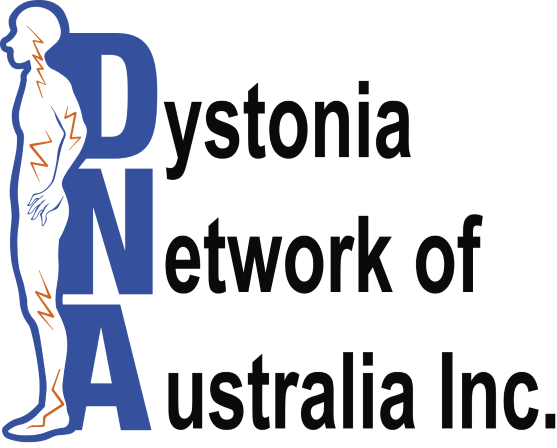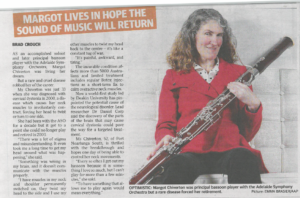2023 – Botulinum Toxin and Conservative Treatment Strategies for managing Cervical Dystonia
This Australian study involved a survey of people with cervical dystonia and investigated the use of botulinum toxin injections and other strategies. Read about the survey and results here.
2023 – Isolated Cervical Dystonia: Diagnosis and Classification
This paper proposes a consensus on diagnostic criteria and classification of isolated cervical dystonia. Read the paper here.
2023 – Treatment of tardive dystonia: A review
This paper describes the clinical features of tardive dystonia and the range of treatments. Read the review on the Frontiers Publishing Partnerships website here.
2022 – Role of supplementary motor area in cervical dystonia and sensory tricks
Many people with cervical dystonia have a sensory trick which can temporarily alleviate their symptoms. In this study, researchers used MRIs to identify the area of the brain involved in sensory tricks. Read the study on the National Library of Medicine (US) website here.
2022 – ‘Dystonia’ – inaugural issue of journal devoted entirely to dystonia
The Dystonia Medical Research Foundation and Frontiers Publishing Partnerships are collaborating on a journal devoted entirely to dystonia articles submitted by health professionals. Their inaugural issue contains articles on the following:
- Tremor in Writer’s Cramp Patients: A Retrospective Study
- Observing the Diversity of Alleviating Manoeuvres in Cervical Dystonia
- Approach to the Treatment of Paediatric Dystonia
Access the journal here.
2022 – Approach to the treatment of paediatric dystonia
This Canadian research paper gives very comprehensive information about treatments in paediatric dystonia here.
2022 – Development of a patient journey map for people living with cervical dystonia
This interesting paper identifies issues of patients from pre-diagnosis through to long-term treatment. Read it on the National Library of Medicine (US) website here.
2022 – Deep Brain Stimulation in dystonia: factors contributing to variability in outcome in short and long term follow-up
This paper by one of our advisory board members, Dr Stephen Tisch, summarises the factors which may contribute to the outcome of DBS. Read about it in the Current Opinion in Neurology Journal here.
2022 – Dystonia
This paper brings together previous dystonia research and puts it together to form a concise, easy to understand summary of dystonia, types and categories, causes and treatment options. Read it on the National Library of Medicine (US) website here.
2022 – Trial of new measurement scale for musician’s dystonia
This interesting Italian study trialled a functional rating scale for musician’s dystonia which may help facilitate patients’ engagement in their treatment. Read it on the ScienceDirect website here.
2021 – Dystonia Management: What to Expect from the Future? The Perspectives of Patients and Clinicians Within DystoniaNet Europe
This is a very interesting article from DystoniaNet Europe which gives valuable insight into the patient’s experience, future possibilities and the importance of collaborating and networking to improve treatment and outcomes. Read it on the Frontiers in Neurology website here.
2021 – Neurorehabilitation in Dystonia: A Holistic Perspective
To access this research paper about rehabilitation in dystonia on the National Library of Medicine (US) website please click here.
2020 – Treatment of Dystonia: Medications, Neurotoxins, Neuromodulation, and Rehabilitation
To access this informative research paper about dystonia treatments on the National Library of Medicine (US) website please click here.
2020 – Neurophysical insights in dystonia and its response to deep brain stimulation treatment
To access this research paper on deep brain stimulation on the National Library of Medicine (US) website please click here.
2019 – How satisfied are cervical dystonia patients after 3 years of botulinum toxin type A treatment? Results from a prospective, long term observational study
If you have cervical dystonia and are receiving or considering botulinum toxin therapy you may wish to read this study in the Journal of Neurology here.
2019 – Physical Activity and Exercise with Dystonia
To access this research article on the Frontiers in Neurology website please click here.
2019 – Cervical Dystonia & Brain Mapping
With permission of Dr Daniel Corp, Elise Snashall-Woodhams of Deakin University and Margot Dean
To read a related research article co-authored by Dr Corp please click here.
2019 – Visual Compensation in Cervical Dystonia
To read the study on visual compensation in cervical dystonia in the Journal of Clinical and Experimental Neuropsychology click here.
2017 – Gait and Balance in Cervical Dystonia
To read the results of a study of balance, stepping reactions and gait in people with cervical dystonia on the ScienceDirect website click here.
2014 – Direct Current Simulation of Primary Motor Cortex and Cerebellum and Botulinum Toxin A Injections in a Person With Cervical Dystonia
To read about this study on augmentation of botulinum toxin injections using direct current stimulation please go to the Brain Stimulation Journal website here.
2013 – Motor and Sensory Dysfunction in Musician’s Dystonia
To read this study please go to the National Library of Medicine (US) website here.
2013 – Clinical significance of pharmacogenic studies in tardive dyskinesia associated with patients with psychiatric disorders
To read about this research paper by DNA advisory board members Dr Florence Chang and A/Professor Victor Fung please go to the National Library of Medicine (US) here.
2012 – Active exercise for individuals with cervical dystonia: a pilot randomised controlled trial
To read the abstract of this trial of an addict exercise program for individuals with cervical dystonia please go to the Sage Journals website here.
Page last reviewed and updated 7 April 2023




